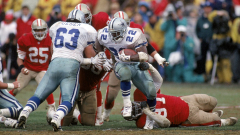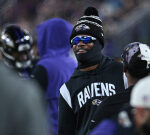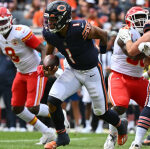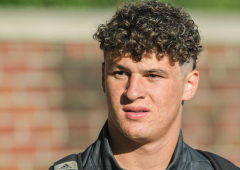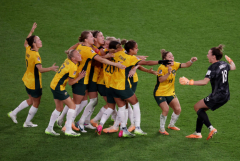On Sunday of the divisional playoff round, the Dallas Cowboys and San Francisco 49ers will renew one of the NFL’s all-time great playoff rivalries.
While the Cowboys and 49ers now will meet in the playoffs in back-to-back seasons, sports fans of a certain age will remember a period of time when these two teams were simultaneously the class of the NFL.
Sunday will mark the 49ers’ and Cowboys’ ninth meeting in the playoffs. That matches Rams-Cowboys and 49ers-Packers for the most of any matchup in the Super Bowl era.
Consider this your historical refresher of just how huge 49ers-Cowboys playoff matchups used to be. Here are the greatest playoff games between the two teams:
NFL newsletter: Sign up now to get football news delivered to your inbox
1. 1981 NFC championship game (‘The Catch’)
The most famous 49ers-Cowboys playoff showdown and one of the greatest games in NFL history is known simply as “The Catch.” The game serves as the symbolic end of conference domination for “America’s Team” and the start of the 49ers’ dynasty.
The celebrated highlight of this back-and-forth clash came when wide receiver Dwight Clark made a leaping catch in the back of the end zone for the winning score in the game’s final minute.
Down 27-21 and facing a third-and-3 from the Cowboys’ 6-yard line with 58 seconds remaining in the game, Hall of Fame quarterback Joe Montana capped a methodical 14-play, 83-yard drive with the famed touchdown pass to Clark in the 28-27 win.
The victory set the 49ers on course to win the first Super Bowl in team history. While the Cowboys reached the NFC title game the next season – losing to Washington – the franchise would hit rock bottom by the end of the decade. By then, the 49ers had captured four Vince Lombardi Trophies.
2. 1992 NFC championship game
Under the guidance of Hall of Fame coach Jimmy Johnson, the Cowboys made a rapid ascent from a 1-15 laughingstock in 1989 to title contenders just three years later. Standing in their way were the mighty 49ers, title contenders for a decade-plus since their epic victory over the Cowboys in the 1981 NFC championship. The 49ers were now led by quarterback Steve Young, who had taken over the reins from Joe Montana and earned league MVP honors in 1992.
Played at a wet and muddy Candlestick Park (this becomes a theme), the Cowboys issued a changing-of-the-guard warning with a 30-20 victory. Troy Aikman threw for 322 yards and two touchdowns, Emmitt Smith rushed for 114 yards and a touchdown, and wide receiver Alvin Harper made a clutch play to help propel Dallas to victory.
In the postgame locker room, cameras caught a jubilant Johnson yelling, “how ’bout them Cowboys!” The Cowboys went on to win Super Bowl XXVII over the Buffalo Bills for the team’s first Super Bowl victory in 15 years.
(As an aside, and not to be all “get off my lawn,” but they just don’t make big game intros like they used to).
3. 1994 NFC championship game
After consecutive NFC championship game losses to the Cowboys, the 49ers used a recently added roster-building mechanism called free agency to load up for a run at finally vanquishing the Cowboys. The prize acquisition for the 49ers was Deion Sanders, the NFL’s preeminent cornerback.
This matchup featured quite possibly the greatest collection of on-field talent of any game in league history. Both quarterbacks – Steve Young and Troy Aikman – are in the Pro Football Hall of Fame. Emmitt Smith is the league’s all-time leading rusher; Jerry Rice the all-time leader in receiving yards and touchdowns scored (by a lot). Hall of Famers Sanders, Rickey Jackson and Bryant Young played for the 49ers; Michael Irvin, Larry Allen and Charles Haley for the Cowboys, who also featured one of the greatest offensive lines in NFL history.
Earlier in the season, the 49ers finally had defeated the Cowboys and were motivated to repeat that statement win and prevent Dallas from reaching a third straight Super Bowl. The championship game got off to a dream start for San Francisco at muddy Candlestick Park. Eric Davis had a pick-six of Aikman on the game’s third play from scrimmage. On the next possession, the Cowboys fumbled, the 49ers recovered and five plays later they went up 14-0 on a Young pass to running back Ricky Watters. The Cowboys fumbled the ensuing kickoff, and seven plays later the 49ers went up 21-0 on a touchdown run by William Floyd.
Taking down the two-time defending champions wouldn’t be that easy, however. The Cowboys attempted a valiant comeback. While the Cowboys didn’t get to within 10 points of the 49ers, they made sure the outcome was in doubt until late in the game. A no-call on a possible pass interference by Sanders on Irvin was a pivotal decision that helped seal the Cowboys’ fate in a 38-28 win for the 49ers.
The 49ers went on to win Super Bowl XXIX for their fifth NFL title. A year later, the Cowboys won their third Super Bowl in four years to mat

